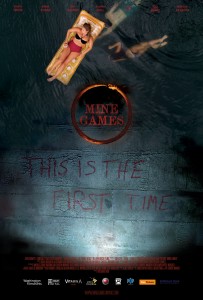A predictable mish-mash of familiar horror movie characters and devices, you won’t want to go back into the mine.
[stextbox id=”grey” caption=”Mine Games (2012)” float=”true” align=”right” width=”200″]
Director: Richard Gray
Writer(s): Ross McQueen, Richard Gray, Michele Davis-Gray
Runtime: 91 minutes
Starring: Briana Evigan, Julianna Guill, Ethan Peck, Alex Meraz, Joseph Cross, Rafi Gavron, Rebecca Da Costa
Festival: Melbourne International Film Festival 2012
Country: US
Rating (?): It’s Your Money (★½)
[/stextbox]
Australian filmmaker Richard Gray made his break onto the local scene with his Project Greenlight runner-up Summer Coda (2010), a film the distributors billed as a being in the vein of Bernardo Bertolucci’s Stealing Beauty. With his follow-up Mine Games, Gray plunges into the depths of a well-worn genre, and fails to come up with anything new. This completely unremarkable spin on the ‘spam in a cabin’ genre fails to learn anything from the countless imitators and cookie-cutter films that have come before, outright borrowing from a number of them, making this sophomore effort feel more like an awkward debut.
Seven young friends head out to a remote cabin in the woods (stop us if you’ve heard this one before), but a car accident forces them to abandon their car and walk the rest of the way. Arriving at what they assume is the correct house, they await the owners with a growing sense of dread that something is not quite right. Repeatedly reminded that Michael (Joseph Cross) hasn’t taken his ‘pills’, things take a turn for the completely expected upon the discovery of an old mine in the middle of the woods.
In the wake of this year’s superb The Cabin in the Woods, the bar for all horror films was raised by several notches. While it would be unfair to criticise Mine Games purely for its unoriginality, a finger that can surely be levelled at virtually any genre pic, if you are going to make a vanilla cupcake, then it has to be a superb one. Taking itself far too seriously, the set-up follows the rules to the letter, burdening every character with explanatory speech and exposition, so much so that there is an expectation that there will be a ‘twist’ coming at any moment. This too is built into the narrative with the discovery of the mine, yet all it manages to do is add another layer of convolution to this paper-thin outing. In using the symbol of the ouroboros as a recurring motif, a serpent that eats its own tail, Gray has also graphically demonstrated what this film is fundamentally doing to itself.
The cast of young actors have all seen their share of screen time over the last few years, including actual Friday the 13th (2009) star Juiliana Guill, and their failure to elevate the film is scarcely their fault. Gray’s script, co-written with Michele Davis-Gray and Ross McQueen, gives them little to do beyond running around and looking scared, and while the looping nature of the story might be ostensibly a clever idea, it also lacks a clear antagonist. Devoid of an immediate threat, the decision of the characters to repeatedly return to the mine becomes increasingly ponderous and unlikely, with an unseen force acting as more of a catch-all god-machine. It certainly eschews having to adhere to that pesky notion of a story arc or character development. Particularly insidious is the fall-back ‘Latino mystical chick’ (Rebecca Da Costa), the only one who can see some of the strings behind the scenes, and the seemingly mandatory inclusion of the ‘annoying British guy’ in Rafi Gavron.
While Mine Games uses the rather interesting location of a mine to stage its terror, the flat photography shines too much of a light on the dark corners, electing for a ‘show it all’ approach and thus sapping any of the remaining suspense. Indeed, Mine Games feels like a bad student film, and not the work of a group of internationally recognised filmmakers who have been working together for several productions. As the film repeatedly reminds us, we need to break the cycle, and this is where audiences can take control and demand a better class of horror. Filled with thoughts that never play out, this is one film that should remain buried.
Mine Games played at the Melbourne International Film Festival in August 2012. At the time of screening, it did not have a distributor.







Summer Coda was the runner up in Project Greenlight.